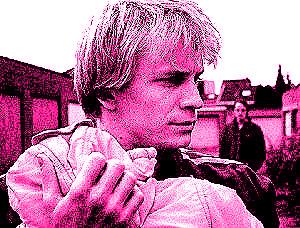Film Review

L'Enfant is a simple but very potent film, crafted with an economy and precision that invests it with great realism and truthfulness. From the way it is shot and acted, it has the look and feels of a documentary, yet the power of the story it tells gives it an extraordinary emotional hold on the spectator. The film is both a shocking reminder of the fault lines that run through our seemingly civilised and prosperous western society and a latter-day parable of a man's fall from grace and ultimate redemption.
Renier's brooding yet sympathetic performance vividly evokes the fragility and despair felt by those who end up turning to crime when everything else - education, social support and youth employment initiatives - have all failed to help them make the transition from adolescence to adulthood. It's a tough film to watch, but how much tougher is it to live the life we see portrayed on the screen? A memorable and highly poignant piece of social realist cinema.
© James Travers 2008
The above content is owned by frenchfilms.org and must not be copied.
Film Synopsis
Bruno, 20, and his girlfriend Sonia, 18, are both unemployed, but they manage to get by with welfare payments and a small income from Bruno's petty crimes. Things become harder when Sonia gives birth. Bruno appears to be more preoccupied with making easy money than caring for his newborn child. Sonia is far from pleased when he sublets their tiny apartment to strangers, but Bruno manages to top this by selling their baby to an illegal adoption ring. When a traumatised Sonia is admitted to hospital, Bruno hastily recovers the baby, but the harm he has caused looks to be irreparable. Rejected by Sonia, unable to pay his debts, Bruno sinks deeper into the mire of crime and social exclusion...© James Travers
The above content is owned by frenchfilms.org and must not be copied.
Similar Films
Here are some other films you may enjoy watching:Other related links:
Film Credits
- Director: Jean-Pierre Dardenne, Luc Dardenne
- Script: Jean-Pierre Dardenne, Luc Dardenne
- Cinematographer: Alain Marcoen
- Cast: Jérémie Renier (Bruno), Déborah François (Sonia), Jérémie Segard (Steve), Fabrizio Rongione (Jeune Bandit), Olivier Gourmet (Policier en civil), Anne Gerard (Commerçante), Bernard Marbaix (Commerçant), Jean-Claude Boniverd (Le Policier en civil), Frédéric Bodson (Bandit plus âgé), Marie-Rose Roland (Une infirmière), Leon Michaux (Policier Commissariat), Delphine Tomson (La fille aux cheveux rouges), Stéphane Marsin (Jeune Homme), Samuel De Ryck (Thomas), François Olivier (Remy), Hicham Tiberkanine (Abdel), Hachemi Haddad (La concierge du toit), Stéphane Bissot (La receleuse), Cécile Boland (La vendeuse landau), Annette Closset (Infirmière ONE)
- Country: Belgium / France
- Language: French
- Support: Color
- Runtime: 100 min
- Aka: The Child
The very best of Italian cinema

The best of Indian cinema

The very best American film comedies
